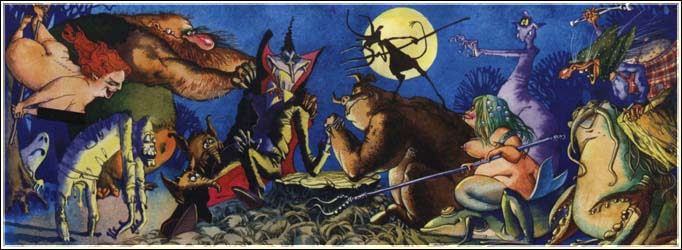

In addition to worshipping higher deities like Perun, Veles, Dazh'-Bog, Makosha etc. the Slavs of Ancient Rus revered all elements - first of all the elements of water (streams, rivers, lakes), fire, plants, stones; also they honored the spirits of dead ancestors. But besides higher deities and living elements, the inhabitants of Ancient Rus were in constant touch with "lower" deities: vodianoi -- water-sprite, domovoi -- house spirit, leshyi -- wood-goblin, kikimora -- female house spirit, upyr' -- vampire, rusalka -- water-nymph.
The most important spring holidays like Easter, Trinity, as well as other significant dates in peasants' calendar, are connected with commemoration of dead parents and ancestors. At the first spring thaw peasants would say: "The parents breathed warmth from the grave", as though the dead would start breathing easier when the earth thaws and warms up. By analogy: "the winter will set in - the dead will go to sleep".Special attention in peasants' beliefs was given to those who during their lifetime were close to evil forces, and those who died a sudden violent death. The earth doesn't accept this kind of dead, they are doomed to wander around for the rest of the years that they were supposed to live; they keep the same shape they had during their lifetime, and sometimes this shape can be taken over by the devil. People who died within the territory of forest and water spirits become their possession, and sometimes they themselves become forest and water spirits.
 This is the spirit of the forest, the master of the thicket and of all the animals who live there. He can change his height -- become as high as trees or as low as grass and hide under fallen leaves. Respecting the rights of the spirits of the field, he seldom steps into fields. Likewise he never goes into villages in order not to quarrel with house spirits. He can fill the forest with sounds like laughing, calling out, crying, clapping hands. Although he seldom harms people, his pranks can be spooky and wicked. People who go to the forest to pick mushrooms and berries can be led on by him into the very heart of the forest from where they cannot get out and for hours and even days go in circles constantly coming back to the same spot.
This is the spirit of the forest, the master of the thicket and of all the animals who live there. He can change his height -- become as high as trees or as low as grass and hide under fallen leaves. Respecting the rights of the spirits of the field, he seldom steps into fields. Likewise he never goes into villages in order not to quarrel with house spirits. He can fill the forest with sounds like laughing, calling out, crying, clapping hands. Although he seldom harms people, his pranks can be spooky and wicked. People who go to the forest to pick mushrooms and berries can be led on by him into the very heart of the forest from where they cannot get out and for hours and even days go in circles constantly coming back to the same spot.
To find the right way while being led on by Leshyi the personshould take off his clothes, turn them inside out and put them on back; if several people are lost, all of them should swap their clothes, also wearing them inside out.
But it is not always possible to come to an agreement with Leshyi.
There is a day when it's better not to go to the forest -- it's on the 4th of October, when Leshyi romps - his boisterous frolicking can be harmful and even lethal to people.
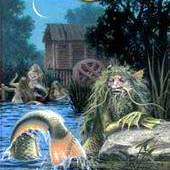 Appears in various shapes, sometimes as a big fish, sometimes as a child, sometimes as a horse etc. But his most frequent shape is that of an old man with a long white or green beard. He lives in deep places in water; his favorite dwelling is under water mills. He is capable of breaking dambs, that's why it is necessary to propitiate him. He protects fishermen, and they sacrifice him a part of their catch. He is often accompanied by female water spirits called Vodianitsy -- they are drowned young women who turned into water elements.
Appears in various shapes, sometimes as a big fish, sometimes as a child, sometimes as a horse etc. But his most frequent shape is that of an old man with a long white or green beard. He lives in deep places in water; his favorite dwelling is under water mills. He is capable of breaking dambs, that's why it is necessary to propitiate him. He protects fishermen, and they sacrifice him a part of their catch. He is often accompanied by female water spirits called Vodianitsy -- they are drowned young women who turned into water elements.
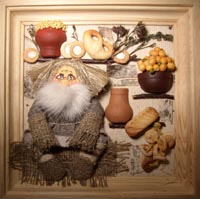 He is the invisible master of the house and the backyard. His responsibilities are to take care of the livestock and to predict the future of the household members. He is a protector, a bread-giver. Sometimes he becomes naughty, knocks, plays practical jokes. Domovoi helps a hardworking master and is nasty towards a lazy one. It is worthwhile to please him by leaving some food - bread, salt, cereal. If two house spirits happen to live in the same house, they compete and quarrel.
He is the invisible master of the house and the backyard. His responsibilities are to take care of the livestock and to predict the future of the household members. He is a protector, a bread-giver. Sometimes he becomes naughty, knocks, plays practical jokes. Domovoi helps a hardworking master and is nasty towards a lazy one. It is worthwhile to please him by leaving some food - bread, salt, cereal. If two house spirits happen to live in the same house, they compete and quarrel.
While moving house it is advisable to perform a rite in order to encourage the house-spirit to move together with the owners and help them at the new place.
 A female house spirit. It is believed that Kikimora is the wife of Domovoi - the male house spirit. Her favorite passtime at night is to tangle yarn, scare small chilren, steal chickens. There are special invocations to rid the house of Kikimora. As mischievous as she is, Kikimora patronizes hardworking housewives, and causes damage to lazy ones.
A female house spirit. It is believed that Kikimora is the wife of Domovoi - the male house spirit. Her favorite passtime at night is to tangle yarn, scare small chilren, steal chickens. There are special invocations to rid the house of Kikimora. As mischievous as she is, Kikimora patronizes hardworking housewives, and causes damage to lazy ones.
He is invisible, but sometimes can assume a human shape. His role is determined by the importance of the bath house in Russian way of life. He lives under the floor or behind the stone furnace. He can be naughty and throw a hot stone or pour boiling water on the bathing person. He can be propitiated by a piece of rye bread or a sacrificed chicken. There always should be water, soap and broom left for him because he bathes after everyone leaves.
 Demonic entities, evil and harmful. They are identified with corpses coming out of graves at night, ambushing and killing people and livestock, and drinking their blood.
In its lifetime a vampire was an evil sorcerer, or a notorious drunk, or a potential suicide. After his or her “death”, or transition, the person becomes a vampire. In the daytime it rests in its coffin; its body is immune to decomposition. At nighttime it gets up, and its appearance is almost like that of a living person – it can easily pass itself off as one. What gives it away is the habit to loudly click its tongue and smack its lips.
Demonic entities, evil and harmful. They are identified with corpses coming out of graves at night, ambushing and killing people and livestock, and drinking their blood.
In its lifetime a vampire was an evil sorcerer, or a notorious drunk, or a potential suicide. After his or her “death”, or transition, the person becomes a vampire. In the daytime it rests in its coffin; its body is immune to decomposition. At nighttime it gets up, and its appearance is almost like that of a living person – it can easily pass itself off as one. What gives it away is the habit to loudly click its tongue and smack its lips.
A child-vampire is easy to identify – it has a double row of teeth.
A vampire doesn't hesitate to appear among living people; in communication with them it is melancolic and utterly boring; it seeks opportunity to drink human blood. Its victims change into bloodthirsty monsters themselves, and this way an epidemic of vampirism spreads: there are whole villages of vampires in Herzegovina and Transilvania.
To destroy a vampire one has to pierce it with an ashwood stick and read a prayer.
 Female spirits, opposed to vampires, protect from everything evil, undesirable, unpleasant. Ancient Slavs saw them as givers of water so necessary for soil's fertility. Not only are they worshipped, but also sacrificies are made for them.
Female spirits, opposed to vampires, protect from everything evil, undesirable, unpleasant. Ancient Slavs saw them as givers of water so necessary for soil's fertility. Not only are they worshipped, but also sacrificies are made for them.
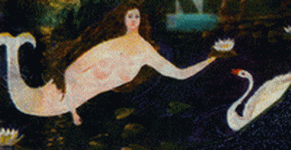 Rusalka is half-woman, half-fish. Rusalkas have long loose hair. Girls who didn't live to their wedding become rusalkas. They can be met at many places: in fields, by water sources, in trees. Especially often they are seen during "rusalkas' week" when rye is in blossom. This is rusalkas' holiday, and it is forbidden to work at this time, otherwise rusalkas will tread the crops of a tresspasser, or curse his livestock.
Rusalka is half-woman, half-fish. Rusalkas have long loose hair. Girls who didn't live to their wedding become rusalkas. They can be met at many places: in fields, by water sources, in trees. Especially often they are seen during "rusalkas' week" when rye is in blossom. This is rusalkas' holiday, and it is forbidden to work at this time, otherwise rusalkas will tread the crops of a tresspasser, or curse his livestock.
Rusalkas like ambushing young men traveling alone; if they catch one they will tickle him to death.
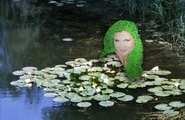 When an unchristened baby-girl drowns by accident or is deliberately killed by drowning, she continues to exist as a water spirit that looks like a girl with long green hair. Her body and face are beautiful but there is no life in them: she's not alive. She can be in this state for a long time until she grows to look like a mature woman. If she falls in love with a man and he willingly gives her his love, she comes alive, and he dies. After this she becomes a rusalka.
When an unchristened baby-girl drowns by accident or is deliberately killed by drowning, she continues to exist as a water spirit that looks like a girl with long green hair. Her body and face are beautiful but there is no life in them: she's not alive. She can be in this state for a long time until she grows to look like a mature woman. If she falls in love with a man and he willingly gives her his love, she comes alive, and he dies. After this she becomes a rusalka.
(Read the story MAVKA)
 The spirit that lives in ovin (barn) and protects the grain and hay from curse and fire. He looks like an old man and loves getting presents. He doesn't allow to work in the barn during big holidays and also on windy days. He dislikes negligent housekeepers and punishes them in all ways, even hits them. Ovinnik is a very noisy spirit: he claps his hands, laughs loudly, barks like a dog. Before starting work in the barn, it is advisable to ask his permission.
The spirit that lives in ovin (barn) and protects the grain and hay from curse and fire. He looks like an old man and loves getting presents. He doesn't allow to work in the barn during big holidays and also on windy days. He dislikes negligent housekeepers and punishes them in all ways, even hits them. Ovinnik is a very noisy spirit: he claps his hands, laughs loudly, barks like a dog. Before starting work in the barn, it is advisable to ask his permission.
The space of the house is totally protected, "closed" from wood-, water-, barn- and other spirits and entities that do not belong to the house. Only house spirits and souls of the dead can come and stay in the house whenever they want.